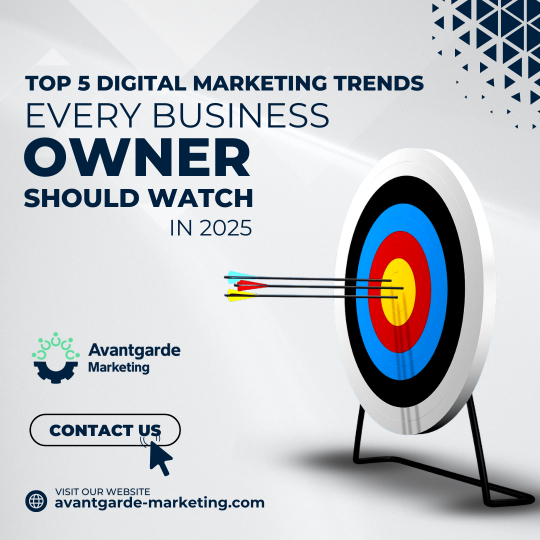
As the digital landscape continues to evolve, 2025 is poised to bring even more advancements and innovations to the marketing world. For business owners, staying ahead of these trends is essential to remain competitive and meet the ever-changing expectations of consumers.
From the rise of AI-driven technologies to the increasing importance of data privacy, here are the top 5 digital marketing trends to watch in 2025:
1. Hyper-Personalization Through Advanced AI
While AI-powered personalization has been a growing trend, 2025 will push the boundaries with hyper-personalization. Leveraging advanced AI and machine learning, businesses will be able to create highly tailored customer experiences based on real-time data. This could include personalized content, recommendations, and even dynamically changing websites based on a user’s behavior.
Why it matters: Consumers will expect brands to understand their needs before they even express them. Hyper-personalization will not only improve customer experience but also drive conversions, as businesses can deliver the right message at the perfect time.
2. The Metaverse and Virtual Experiences
The concept of the metaverse, a fully immersive virtual world where users can interact, work, and shop, will become mainstream by 2025. Brands will start creating their own virtual spaces for product showcases, events, and customer engagement. Virtual reality (VR) and augmented reality (AR) will also be increasingly integrated into marketing campaigns to provide interactive experiences that blend the digital and physical worlds.
Why it matters: As more consumers spend time in virtual environments, businesses need to create immersive experiences to stay relevant. The metaverse offers new opportunities for branding, engagement, and even virtual commerce.
3. First-Party Data and Privacy-First Marketing
With increasing data privacy regulations and the phasing out of third-party cookies, businesses will need to rely more on first-party data—information they collect directly from their customers. By 2025, we will see a major shift toward privacy-first marketing strategies that focus on building trust with customers through transparent data collection practices. Brands will also prioritize giving users control over their data.
Why it matters: Privacy-conscious consumers are becoming more selective about which brands they engage with. Businesses that focus on ethical data collection and use first-party data effectively will build stronger, long-lasting relationships with their audience.
4. Voice and Visual Search Dominance
The dominance of voice and visual search will reshape how users find products and services online. By 2025, more consumers will be using voice assistants and image-based search to interact with brands. Optimizing for these search types will be crucial, as traditional text-based SEO may no longer be sufficient.
Why it matters: Businesses that optimize for voice and visual search will gain a competitive edge, especially in e-commerce. Implementing features like image recognition, voice-activated shopping, and optimizing for conversational search queries will be essential for attracting and retaining customers.
5. Sustainability as a Core Brand Value
Sustainability has been a growing concern for consumers, and by 2025, it will become a core expectation for brands. Companies will need to demonstrate a genuine commitment to sustainability, not just through marketing, but also in their business operations. Consumers will favor brands that are transparent about their environmental impact, use sustainable materials, and support green initiatives.
Why it matters: Sustainability will not just be a selling point—it will become a core element of brand identity. Businesses that fail to align with sustainable practices risk losing credibility and customer loyalty. Incorporating eco-friendly messaging into marketing campaigns and highlighting efforts to reduce environmental footprints will be key to long-term success.
Conclusion:
As we look ahead to 2025, it’s clear that the digital marketing landscape will be shaped by rapid technological advancements and shifting consumer expectations. Hyper-personalization, immersive virtual experiences, privacy-first strategies, voice and visual search optimization, and sustainability will all play pivotal roles in how businesses connect with their audiences.
Business owners who stay ahead of these trends will not only meet the demands of tomorrow’s consumers but will also thrive in an increasingly competitive digital world. Preparing for these changes now will allow you to adapt more easily and capitalize on the opportunities that 2025 will bring.

